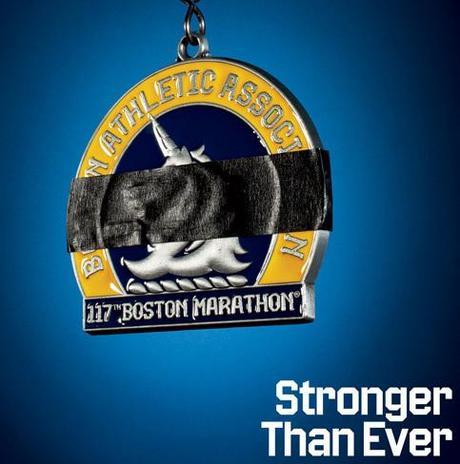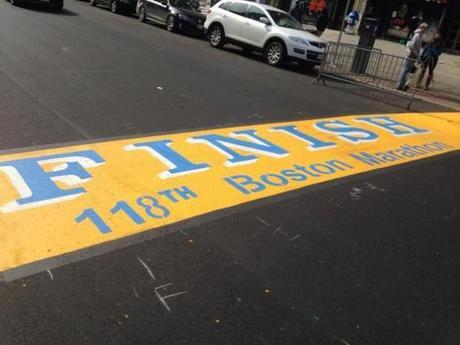The race has become my theater for heroism, and of all the races, there is no better stage for heroism than a marathon.
– George Sheehan

(photo credit Runner’s World)
I can’t believe it’s been a year.
It’s no exaggeration to say next week’s 118th Boston Marathon will be the most significant marathon in American history. From an historical, cultural and psychological perspective, Monday will stand alone. That’s a mind-boggling thought for the world’s oldest annual marathon, and one that’s witnessed its share of memorable moments through the years including:
- 1966, when Bobbi Gibb became the first woman to complete the Boston Marathon.
- 1967, when Kathrine Switzer became the first woman to race (and finish) with a bib number.
- 1996, the Marathon’s Centennial celebration; with a field of 38,708 entrants it was the largest marathon ever at the time, and remains the largest Boston field to date.
- 2011, the Year of the Great Tailwind (15-20 mph), when Geoffrey Mutai of Kenya set the current (unofficial) marathon world record in 2:03:02, with Ryan Hall setting the American record in 2:04:58.
Last year, of course, changed everything. If you doubt this for a second, do a Google Images search for “Boston Marathon” and – if you can stomach the results – count how many of the first 100 photos show the race itself.
I still pause whenever I hear someone refer to those “affected” by the bombings, because I don’t know a single runner who wasn’t affected. Physically I sat a continent removed from Boston, and yet I felt an indelible nexus with every person in Copley Square that day. I knew several people who ran the race – some finished, some didn’t, though luckily all escaped physical injury. And in the immediate aftermath, as reality gradually superseded surreality, I couldn’t help feeling as though I passed through all seven stages of grief, my brain periodically regressing to step one to start the process all over again.
So then as all eyes again turn toward the Mecca (check that, Mecc-er) of marathoning, you can bet I’m looking forward to next week’s Boston Marathon for a whole lot of reasons:
I look forward to what may be the most patriotic Patriots’ Day since the Battles of Lexington and Concord. Boston is a proud city on a normal day, and a 26.2-mile urban party on a “typical” Patriots’ Day. So I can only imagine the cathartic high that awaits the city on Monday. As Spinal Tap lead guitarist Nigel Tufnel proudly described his amp’s unconventional volume knobs, “These go to 11.” On Monday, I expect Boston to go to 11.
I look forward to the suffocating media coverage. As much as I’d love to be sporting a Boston Athletic Association bib number on Monday, I’ll instead enjoy chasing the unicorn in spirit, and in solidarity with each of the nearly 36,000 runners who earned their coveted spot.
At the same time, I’ll stand ready here in California to join in on the national anthem, or the city’s adopted civic anthem (“I’m Shipping Up to Boston” by Dropkick Murphys), or wherever my vocal stylings may be needed. Or more importantly not needed, as during the pre-race moment of silence to honor the victims and survivors of April 15.
I look forward to reading first-hand accounts of the day – at least those that don’t succumb to the writing equivalent of hyperventilation before the race even begins (OMG OMG OMG, BOSTON!!!!!! Here are ten selfies in my blue and yellow gear I bought at the expo!!!). I can’t wait to ride the day’s whirlwind of emotions, on social media and through the eyes of my fellow bloggers – from charged anticipation, to irrepressible anxiety, to overwhelming love and respect for the bent-but-not-broken resolve of a city and running community that so easily and eagerly embrace each other.
I look forward to tales from seasoned runners – Boston veterans among them – who find themselves faced with legitimate pre-race butterflies for the first time in years. And I look forward to feeling my own vicarious shot of race-day adrenaline and sharing their start-line goosebumps from 3,000 miles away.
I look forward to mentally wallpapering over the smoke-filled chaos and carnage of 2013, in favor of scenes from the real Marathon – the adrenaline-fueled stampede out of Hopkinton; the unconditional support of raucous and oft-inebriated spectators; the deafening screams of the Wellesley College Scream Tunnel; the quiet confidence of medical personnel treating nothing more than muscle cramps and exhaustion; the exquisite triumph of mylar-wrapped finishers embracing friends and family. Boston 2014 promises to be everything that Boston 2013 could not.
Of course I look forward to the actual race. Although the men’s field reads like a “who’s who” of American distance running (including all-time great Meb Keflezighi), I have no delusions that an American will win on either the men’s or women’s side. Still, I’ll be watching:
- as Jason Hartmann and Shalane Flanagan strive for the podium after each finishing fourth last year (for Hartmann his second consecutive fourth-place finish);
- as Dennis Kimetto of Kenya, who ran a course-record 2:03:45 in Chicago last year, chases Geoffrey Mutai’s Boston record of 2:03:02 (weather and tailwind willing)
- as Ryan Hall – who holds the American marathon record (2:04:58) but who hasn’t raced competitively since DNF’ing at the 2012 London Olympics due to injury – runs to regain his status as America’s premier marathoner, and to prove his days as a sponsor-savvy “golden boy” aren’t behind him.
Meanwhile, over at Fenway Park and with the marathon as their traditional backdrop, I look forward to the World Series Champs channeling the emotions of the day into a hometown drubbing of the Baltimore Orioles.
I look forward to Race Director Dave McGillivray renewing his personal tradition of being the very last finisher in his own race. McGillivray has run every Boston Marathon since 1973, and this year he’ll be running to raise funds for the Martin W. Richard Charitable Foundation.
And I look forward to the last official runner – the one just before RD McGillivray – crossing the freshly painted finish line on Boylston that welcomes each Boston Qualifier into the hallowed ranks of Boston Finisher. As newly anointed finishers sport their BAA swag, flaunt their unicorn medals and raise their pints of Sam Adams Boston 26.2 Brew, that {whoosh} you hear will be an entire nation letting out its collective breath – relief tinged with sadness steeped in defiance. From sea to shining sea.

(photo credit Garrett Quinn, MassLive)
I doubt I’ve read more on any single topic in the past year than on the bombings. Even so, and despite the flood of media attention being rightly directed toward Monday, I’m admittedly looking beyond.
Under the glare of the world’s spotlight, and with cameras documenting the city’s every breath, Monday will be all about moving – moving tributes, moving reminders, moving mountains and of course, moving 26.2 miles. Tuesday, though, is about moving on. For many Bostonians and many others “affected” by the all-too-real nightmare of April 15, Tuesday is about closure.
For the families and loved ones of Krystle Campbell, Martin Richard, Lu Lingzi and Sean Collier, closure will always be that distant point on the horizon that, no matter how far and how fast they run toward it, never seems to get any closer. For others, the notion of closure won’t change a future of constant pain and mounting medical bills. And no matter what happens in that Massachusetts court room in November, closure will never reprise the heroic role of first responder to those who lost limbs, or innocence, or something far less reparable in Copley Square that day. The truth is, time doesn’t heal all wounds.
For many others, though, closure means a much-needed shot at normalcy, a chance to restart lives and press play on a documentary that’s been stuck in slow-motion – or worse, on pause – for a year. A chance to trade in the tears for weak smiles, the weak smiles for guarded laughter, and to move forward with renewed confidence knowing the world is filled with heroes we just haven’t met yet.
For the city itself, it means showing the world that “Boston Strong” isn’t a catchy mantra for a difficult time – it’s a way of life. For runners everywhere, it means doubling down on the blood-, sweat- and tear-soaked training regimens required to qualify for the greatest foot race in the world. For Red Sox and Yankees fans, it means getting back to the knuckleheaded comfort of hating each other, in the sporting-est sense of the word. And for ESPN, it means getting back to the business of barely acknowledging Boston (or any marathon for that matter), since how much of a sport can it really be if America doesn’t dominate its biggest stages?
So even more than the tremendous emotional release that awaits on Monday, I look forward to Tuesday. And the day after that, and the week after that, and the month after that. I look forward to looking back, to remind ourselves not how much we’ve lost, but how far we’ve come.
Most of all, I look forward to looking forward.
∞
For a compelling first-hand account of the 2013 Boston Marathon from someone who was there (and who ran a PR of 2:44:35 before the day fell apart), check out Scott Dunlap’s post on A Trail Runner’s Blog.
For more thoughts on the 2013 Boston Marathon bombings, see my posts “Boston on my Mind” and “Boston F@&#ing Strong”.
